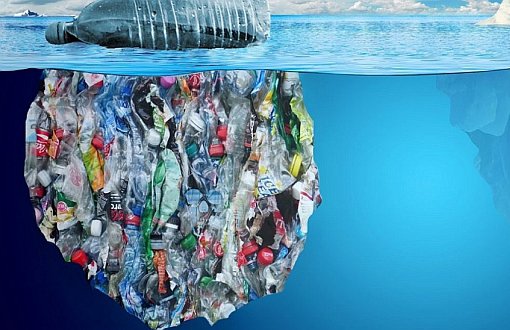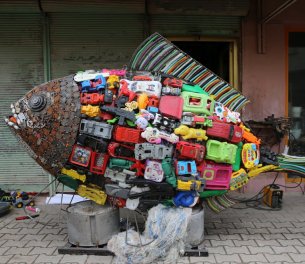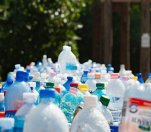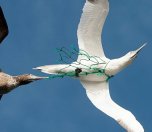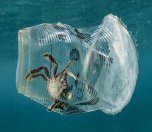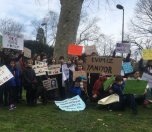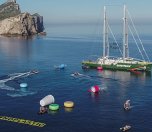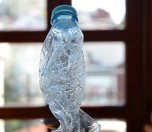* Photograph: Greenpeace
Click to read the article in Turkish
Plastics are made of petroleum, just as fossil fuels. Struggling against both of them is important for climate activists. Even though plastics have been a part of our lives for the last 60 years, millions of tons of plastic waste have already accumulated in the world.
Plastics are a huge problem for our world; though we think that they can be recycled, only 3 percent of plastics can be recycled in Turkey and while they are recycled, they damage the nature.
As for the remaining 97 percent, they remain in nature for thousands of years by either piling on top of each other as waste mountains or ending up in the sea. Sea creatures die by eating plastics in the water. If you follow social media, you can see pictures of several animals such as birds and fishes that are in a defenseless situation in nature.
Let's not forget that plastics generate a huge carbon footprint in its production phases. In short, they harm the nature in every step from the moment they are taken out of the ground to their inclusion in industrial processes and daily use. We all know what happens after that.
All through the nature walk that I took with my family at the weekend, we saw that people threw away their garbage in the most inappropriate places. It was sad, but we were not surprised because I don't remember a single moment when we didn't see plastic bottles, plates or bags in the highest cliffs that we climbed or the most desolate corners of a forest that we walked through.
Plastic free July
This event started as a small office initiative in Australia in 2011 and it has now turned into a campaign that is held in every July across the world to encourage people to give up single-use plastics.
But, what can be done in Plastic Free July? Here are the alternatives that we children start doing in Plastic Free July and we recommend to adults:
- Don't do shopping online.
- Have your water bottle with you all the time, buy water in glass bottles if you really have to.
- Use the metal eating utensils such as spoons, forks and plates that you have in your kitchens in events like picnics or parties as well, don't ever use single-use plastic plates or other eating utensils.
- Say no to plastic straws.
- Use reusable cloth bags or net bags (which were widely used in the past and are sold in several places today). In this way, you will not need plastic bags any more.
- When you go out, take the snacks that you prepare at home with you.
- Carry you beverages in a thermos.
- If you want to buy food, use local bazaars and buy your fruits and vegetables in brown bags.
- Make your own garbage bag by using newspapers.
- Buy your ice cream not in a plastic cup, but in an ice cream cone.
- Instead of buying your bread in a plastic package from the market, buy it from the bakery without any packages.
- Prefer reusable jars to keep your food or to take your lunch with you.
- Don't use balloons.
- Instead of doing shopping online, do it at stores.
- Prefer products that are packaged in recyclable materials such as paper or glass.
- Use natural materials while wrapping something, etc.
Greta was on her own...
The campaign of Plastic Free July can, in fact, continue all year round. In that way, we can also zero the damage that we give to nature by using plastics. You can think that most people have not heard about Plastic Free July and I have written this article so that more people learn about it.
But, if you tell the ones around you about Plastic Free July and climate crisis, it will be much more effective. You will see that activism pays off. People from all around the world have joined school strikes upon the call of Greta, but, in the beginning, Greta was on her own.
Climate crisis... Plastics and species' right to life
I and my other climate activist friends have formed a group named Mosaic Tailed Rat and, in this group, we deal with species that have gone extinct or face the danger of extinction due to climate crisis and environmental problems. First of all, why are we called Mosaic Tailed Rat?
There are millions of species on the planet that have gone extinct, but they are the first species that have been officially recognized as extinct due to climate crisis (the melting glaciers have raised the water levels and this species that used to live in cliffs have gone extinct in silence.)
We mostly hear about polar bears and penguins and they are always in the limelight because we find them cute, but hundreds of species such as insects and amphibians that we have never heard of are getting closer to extinction.
None of us learn our lesson
Even the koalas, one of the symbols of Australia, are in a difficult situation. One consequence of climate crisis is floods and extreme droughts.
While some places receive so much hail in July that they never receive in winter months, others have to deal with a heat of 40 degrees celsius. But, people see it as normal weather conditions.
11 years from now, our World will take an irreversible turn and we have to prevent it. Why are we inflicting an enormous damage on the World by producing nuclear energy or using thermal power plants instead of producing it by using sun and wind energy?
Why don't any of us learn our lesson by looking at what happened in Chernobyl? The world is not solely based on money! While we are letting the world slip through our fingers, we cannot just continue with our lives as if nothing was happening. (GDT/PT/SD)
About Güney Deniz Teke
Climate activist student. He joins the Fridays for Future movement started by Greta Thunberg from Turkey.





